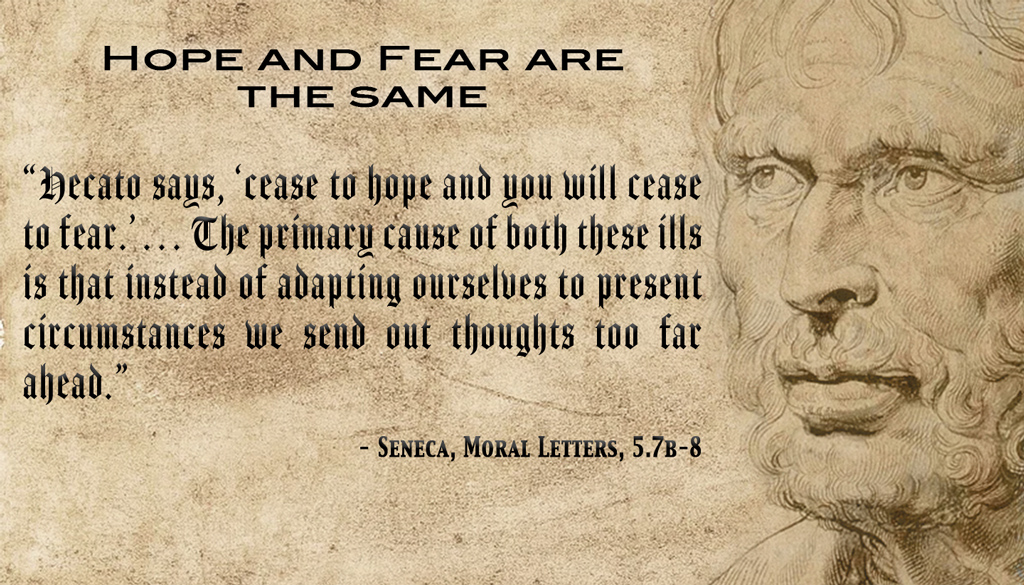In the words of the Stoic philosopher Hecato of Rhodes, “cease to hope and you will cease to fear.” This ancient wisdom, rooted in Stoic philosophy, carries profound relevance in our modern age dominated by constant information overload and a pervasive concern for the future. As we navigate the complexities of the present, Hecato’s insights shed light on the detrimental effects of excessive hope and fear, urging us to embrace the philosophy of amor fati—the love of fate.
Stoicism, a philosophical school of thought that originated in ancient Greece, teaches us to focus on the present moment and accept the things we cannot control. Hecato’s view on hope and fear aligns seamlessly with Stoic principles, emphasizing the dangers of projecting our thoughts too far into the future. To the Stoic mind, both hope and fear are obstacles to living in harmony with the present, as they divert our attention from what truly matters—the current moment.
In today’s fast-paced world, the prevalence of data and the constant stream of information make it increasingly challenging for individuals to remain present (some call it “Data Deluge“). In the contemporary workplace, the incessant influx of data and the omnipresence of technology create an environment that challenges our ability to stay focused. Meetings, planning sessions, and discussions about future strategies, while integral to the work landscape, often find themselves competing for our attention against the backdrop of constant data input.
The very technology designed to streamline our work processes sometimes becomes a double-edged sword, making it difficult to maintain active listening (constant beeps or vibrations from our mobiles, informing us new data has arrived) and engagement during these essential gatherings. The struggle to balance the demands of technology with the need for genuine connection in meetings reflects the ongoing battle to navigate the digital age while preserving the essence of meaningful human interaction. The corporate world is taking notice, with companies recognizing the importance of equipping their employees with techniques for staying focused amidst the chaos.
Two contemporary themes, “Active Listening” and “Mindfulness,” have emerged as antidotes to the growing issue of distraction. Active listening encourages individuals to be fully present in conversations, fostering deeper connections and understanding. Mindfulness, rooted in ancient practices but gaining momentum in the modern world, teaches the art of being fully aware and engaged in the present moment.
Hecato’s wisdom provides a valuable bridge between Stoicism and these modern techniques. By acknowledging the dangers of excessive hope and fear, individuals can integrate Stoic principles into their daily lives. Active listening and mindfulness become more effective when we free ourselves from the burden of projecting too far into the future, allowing us to appreciate the richness of the present.
At the core of Stoicism is the concept of amor fati—the love of fate. Embracing amor fati means accepting the present moment, including its challenges, with gratitude and a sense of purpose. By cultivating this mindset, individuals can navigate the uncertainties of the future without being consumed by hope or fear. Hecato’s timeless advice encourages us to relinquish the need to control the uncontrollable, fostering a sense of inner peace and resilience.
As we stand at the crossroads of ancient wisdom and modern challenges, Hecato’s words echo with profound significance. The integration of Stoic principles, active listening, and mindfulness offers a holistic approach to combating the distractions of the digital age. By consciously choosing to focus on the present, we not only enhance our personal well-being but also contribute to a more mindful and productive society.
Crucially, adopting these practices serves as a safeguard against the looming threat of burnout—a consequence of the relentless pursuit to keep up with the incessant flow of information in our data-saturated world. By embracing amor fati and cultivating a sense of presence, we not only navigate the complexities of the present with grace but also fortify ourselves against the pressures that can lead to burnout. In a world inundated with possibilities and uncertainties, Hecato’s wisdom reminds us to savor the richness of the present moment—the only moment we truly possess.
#leadership #activelistening #mindfulness #datadeluge #stoicism #amorfati


Leave a Reply